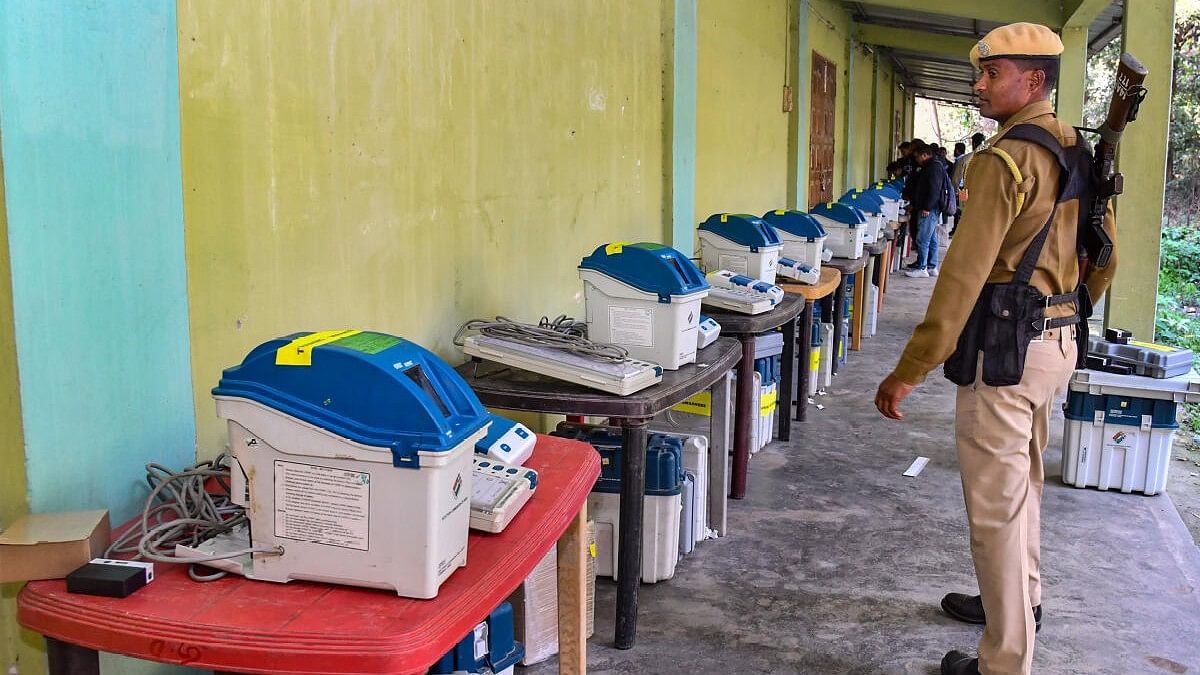
Security personnel stand guard during the display of Electronic Voting Machine (EVM) and Voter Verifiable Paper Audit Trail (VVPAT) during a special training of Zonal and Sector officers ahead of the upcoming Lok Sabha election, in Sonitpur district.
Credit: PTI File Photo
New Delhi: The Supreme Court expressed doubts on Tuesday regarding the feasibility of reverting to ballot papers or implementing 100 per cent counting of Voter Verified Paper Audit Trail (VVPAT) slips in Electronic Voting Machines (EVMs) for the upcoming Lok Sabha elections. The court highlighted that conducting elections in India is a massive undertaking that cannot be equated with the electoral processes of European countries.
"We are in our 60s. What we have seen (in the past), we have not forgotten. We all know what happened when there were ballot papers. You may have forgotten, but we have not," a bench of Justices Sanjiv Khanna and Dipankar Datta said.
Advocate Prashant Bhushan, appearing for NGO Association for Democratic Reforms, contended the court was referring to the incidents of booth capturing.
However, the bench said it was pointing at the larger issue and remarked that conducting elections was a humungous task.
"We don't want to get into it. We all know the drawbacks of the system of ballot papers," the bench added.
Bhushan said the majority of voters do not trust EVMs, which he claimed are vulnerable to manipulation. He asserted that since the source code of the chips installed in the EVMS were not shown, it created greater suspicion.
He referred to the decision of the constitutional court in Germany against the use of EVMs and the return to ballot papers.
The counsel also referred to the SC order in the Subramanian Swamy case, which stressed the use of VVPATs in EVMs.
"What is the population of Germany? Our country can't be compared with any European country. The population of even my state, West Bengal, is greater than any of the European countries. We need to repose some trust and faith. Do not try to bring down the system like this," Justice Datta observed.
Bhushan sought to refer to a private survey claiming the majority of voters don't trust EVMs.
"Let's not go by private polls," the bench said, observing that the number of voters in the country was over 96 crores.
The court also sought to know from senior advocate Maninder Singh, appearing for the Election Commission, whether after voting is done, machines can be subjected to technical inspections and the level of human intervention after polling.
"Machines normally, without any wrong human intervention, will work properly, and will yield accurate results. Yes, the problem arises when there is human intervention to manipulate or make unauthorised changes," the bench recorded.
It fixed the matter for further hearing on Thursday.
The court had on April 1 sought a response from the Election Commission on a plea seeking a complete count of VVPAT slips in elections as opposed to the current practice of verification of only five randomly selected EVMs through VVPAT paper slips.
